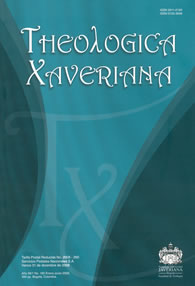Abstract
The crisis of enlightened modernity and the new configuration modes of culture and society, in part manifested by the rise of new rationalities, demand that theology exposes its contributions and its pertinence. With this in mind, this paper seeks to establish an approach to theology from its own epistemological statute (its own language, its scope, procedures, concepts...), so that it can be validated as a
knowledge by an academic community, as a coherent, systematic, methodical, hermeneutical logos that finds in symbolic language its best way of expressing the experience of Theos in the midst of human history. Within this context, theology –which goes through critical times– has to be able to define its permanence as a discipline and as knowledge, as much as the place it takes in the institutions of higher learning, where the validation of its condition of knowledge is at play, even though not in a definitive way.
This journal is registered under a Creative Commons Attribution 4.0 International Public License. Thus, this work may be reproduced, distributed, and publicly shared in digital format, as long as the names of the authors and Pontificia Universidad Javeriana are acknowledged. Others are allowed to quote, adapt, transform, auto-archive, republish, and create based on this material, for any purpose (even commercial ones), provided the authorship is duly acknowledged, a link to the original work is provided, and it is specified if changes have been made. Pontificia Universidad Javeriana does not hold the rights of published works and the authors are solely responsible for the contents of their works; they keep the moral, intellectual, privacy, and publicity rights.
Approving the intervention of the work (review, copy-editing, translation, layout) and the following outreach, are granted through an use license and not through an assignment of rights. This means the journal and Pontificia Universidad Javeriana cannot be held responsible for any ethical malpractice by the authors. As a consequence of the protection granted by the use license, the journal is not required to publish recantations or modify information already published, unless the errata stems from the editorial management process. Publishing contents in this journal does not generate royalties for contributors.


